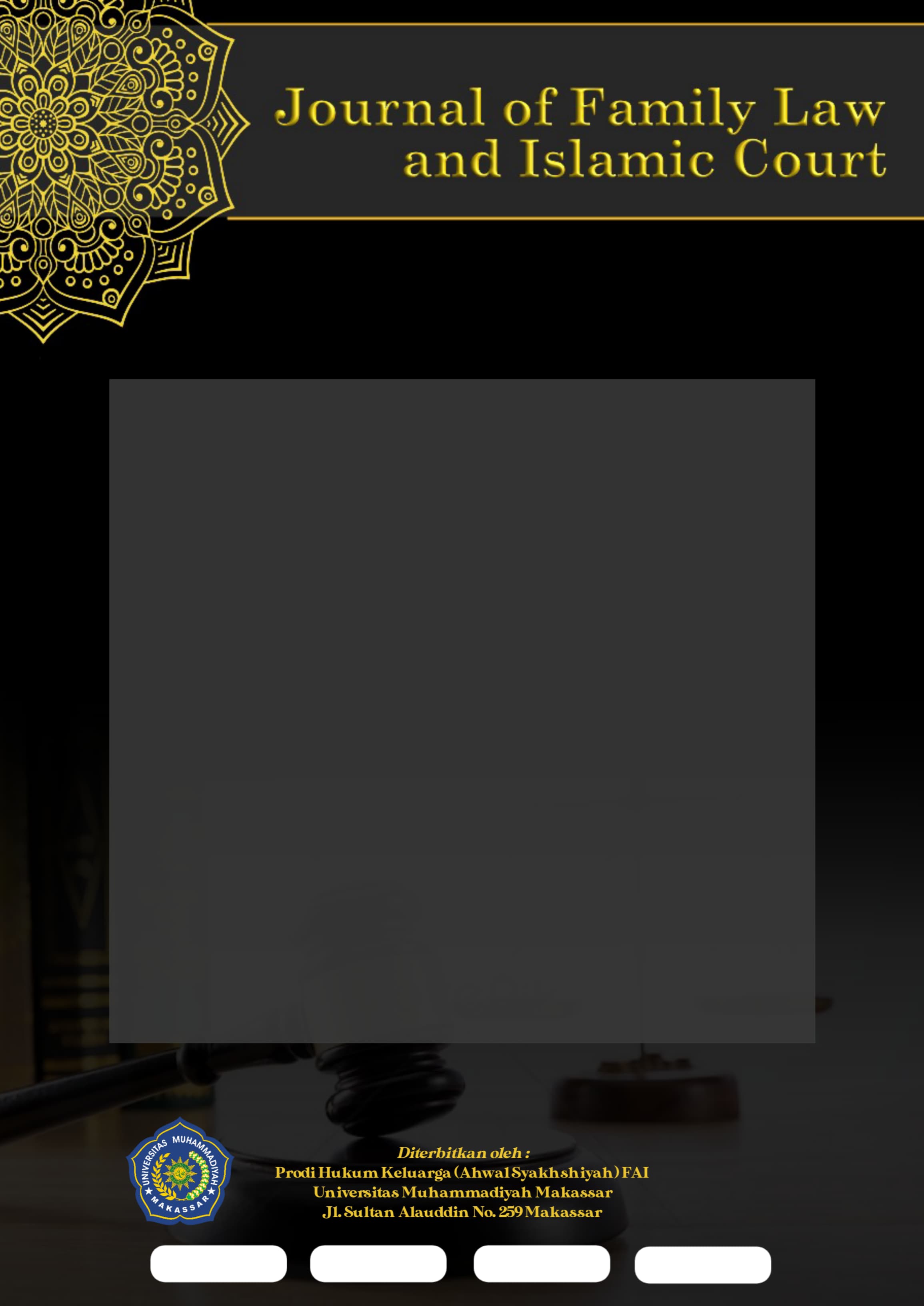Artificial Intelligence and Islamic Law: Ethical Implications and Fiqh Fatwas in the Digital Age
DOI:
https://doi.org/10.26618/jflic.v3i2.16546Abstract
The advancement of Artificial Intelligence (AI) in the digital era has significantly influenced various fields, including health, education, and the legal system. However, alongside its potential benefits, AI also presents complex ethical and legal challenges, particularly within the framework of Islamic law, which is grounded in the Qur'an, Hadith, and fiqh traditions. This study examines how core principles of Islamic law—maslahah mursalah (public good), qiyas (analogy), and dhaman (accountability)—can address these challenges. Additionally, it evaluates the role of fatwas in offering adaptive and relevant legal guidance for modern technological developments. Using a document analysis approach, the research reveals that Islamic law possesses the flexibility to tackle issues such as algorithmic bias, data privacy, and accountability in autonomous decision-making. The principle of maslahah supports the ethical use of AI for the greater public good, while qiyas facilitates the legal adaptation of emerging technologies through analogy with established precedents. Meanwhile, dhaman underscores the necessity of human responsibility in the deployment of AI. However, existing fatwas are often too general and lack detailed guidance on addressing the specific complexities of AI, highlighting the need for a holistic approach that integrates classical Islamic principles with contemporary technological contexts. This research contributes by proposing a more comprehensive ethical and legal framework that aligns AI development and application with Islamic values. Recommendations include producing more detailed fatwas and conducting empirical research involving scholars, policymakers, and technology developers to ensure AI's responsible and beneficial utilization in the digital age.
References
Al-Ghazali, I. (1993). Al-Mustasfa min ‘Ilm al-Usul. Dar al-Kutub al-‘Ilmiyyah.
Almubarok, F. (2018). Keadilan Dalam Perspektif Islam. Journal ISTIGHNA, 1(2), 115–143. https://doi.org/10.33853/istighna.v1i2.6
Amrullah, A., & Hasan, A. (2021). Fintech Keuangan Syariah dalam Perspektif Konsep Syariah. IQTISHADIA: Jurnal Ekonomi dan Perbankan Syariah, 08(02), 234–243.
Asy-Syatibi, I. (1997). Al-Muwafaqat fi Usul al-Shari’ah (Jilid 2). Dar Ibn Affan.
Bowen, G. A. (2009). Document Analysis as a Qualitative Research Method. Qualitative Research Journal, 9(2), 27–40.
Chin, M. H., Afsar-Manesh, N., Bierman, A. S., Chang, C., Colón-Rodríguez, C. J., Dullabh, P., Duran, D. G., Fair, M., Hernandez-Boussard, T., Hightower, M., Jain, A., Jordan, W. B., Konya, S., Moore, R. H., Moore, T. T., Rodriguez, R., Shaheen, G., Snyder, L. P., Srinivasan, M., … Ohno-Machado, L. (2023). Guiding Principles to Address the Impact of Algorithm Bias on Racial and Ethnic Disparities in Health and Health Care. JAMA Network Open, 6(12), E2345050. https://doi.org/10.1001/jamanetworkopen.2023.45050
Creswell, J. W. (2014). Research Design: Qualitative, Quantitative, and Mixed Methods Approaches. Sage Publications.
Dinarti, Di. (2024). Dilema Etika dan Moral dalam Era Digital: Pendekatan Aksiologi Teknologi terhadap Privasi, Keamanan, dan Kejahatan Siber. Jurnal Pendidikan Ilmu Ilmu Sosial dan Humaniora, 2(1), 8–16. https://doi.org/https://doi.org/10.26418/jdn.v2i1.74931
Dinarti, N. S., Salsabila, S. R., Tri, Y., Rizkya Salsabila, S., & Herlambang, Y. T. (2024). Dilema Etika dan Moral dalam Era Digital: Pendekatan Aksiologi Teknologi terhadap Privasi Keamanan, dan Kejahatan Siber. Jurnal Pendidikan Ilmu Ilmu Sosial dan Humaniora, 2(1), 8–16. https://doi.org/10.26418/jdn.v2i1.74931
Djamil, N. (2023). Akuntansi Terintegrasi Islam : Alternatif Model Dalam Penyusunan Laporan Keuangan Nasrullah. JAAMTER: Jurnal Audit, Akuntansi, Manajemen Terintegrasi, 1(1).
Elmahjub, E. (2023). Artificial Intelligence (AI) in Islamic Ethics: Towards Pluralist Ethical Benchmarking for AI. Philosophy and Technology, 36(4), 1–24. https://doi.org/10.1007/s13347-023-00668-x
Fatwa, K., & Ulama, M. (2017a). FATWA-MUI_Medsos. 1–20.
Fatwa, K., & Ulama, M. (2017b). FATWA MAJELIS ULAMA INDONESIA Nomor : 24 Tahun 2017. 1–17.
Fiqh, U. (2024). PERAN QIYAS DALAM PENGEMBANGAN HUKUM ISLAM MODERN : PERSPEKTIF USHUL FIQH. 11, 1166–1173.
Firmansyah, H., & Rusydi, M. (2024). Financial Technology (Fintech) Berdasarkan Prinsip Syariah dan Model Penggunaan Akad Dalam Fintech Syariah : Kajian Terhadap Fatwa DSN MUI. Tabayyanu: Journal of Islamic Law, 01(01), 59–60. https://jurnal.tabayanu.com/index.php/tabayyanu/index%7C58
Fridawati, T., Isan, M., Abdinur, I., Sugawa, F., Rafi, M., WN, Z., Aziz, A., Rahmad, Y., Andika, R., Irfandi, I., Zulhazur, Z., & Putra, D. Y. (2024). Menavigasi Penerapan Hukum Islam dalam Sistem Peradilan Modern. JIMMI: Jurnal Ilmiah Mahasiswa Multidisiplin, 1(1), 78–88.
Hanafi, A. I. (2023). Mengeksplorasi Dampak Inovasi Teknologi Terbaru dalam Investasi Syariah. 1, 1316–1335.
Iib Hibaturohman, D. A. (2024). Konsep Maslahah Mursalah Dalam Menghadapi Ketimpangan Ekonomi Di Era Modern : Prespektif Ekonomi Islam The Concept of Maslahah Mursalah in Facing Economic Inequality in the Modern Era : An Islamic Economic Perspective. 2, 26–36.
Khoirunisa, A., Rohman, F., Azizah, H. A., Ardianti, D., Maghfiroh, A. L., & Noor, A. M. (2023). Islam in the Midst of AI (Artificial Intelligence) Struggles: Between Opportunities and Threats. Suhuf, 35(1), 45–52. https://doi.org/10.23917/suhuf.v35i1.22365
Mafiah, Y., & Hidayati, T. W. (2023). The Significance of Al-Ghazali’s Maslahah Concept to the Development of Usul Fiqh and Islamic Law. AN NUR: Jurnal Studi Islam, 15(1), 34–48. https://doi.org/10.37252/annur.v15i1.444
Muhajir, A. H. (2023). ANALISIS QOWAIDUL FIQHIYAH; SOLUSI TERHADAP TANTANGAN KONTEMPORER. 3(April), 81–94.
Musanna, K. (2022). E-Commerce Practice in the Light of Mashlahah Mursalah. Journal of Islamic Economics Lariba, 8(2), 331–340. https://doi.org/10.20885/jielariba.vol8.iss2.art12
Muvid, M. B. (2023). Teknologi dalam Islam: Studi Analisis Fenomena Kecerdasan Buatan (Artificial Intelligence) Perspektif Islam. Zenoodo, 2(1), 78–89. https://doi.org/10.5281/zenodo.8127202
Nasional, D. S. (不详). FATWA DEWAN SYARIAH NASIONAL. MAJELIS ULAMA INDONESIA NO: 117/DSN-MUI/II/2018.
Nasrullah, D. (2019). Teori Etika. 收入 Keperawatan Keluarga.
Purwaningsih, E., & Islami, I. (2023). Analisis Artificial Intelligence (Ai ) Sebagai Inventor Berdasarkan Hukum Paten Dan Hukum Islam. Jurnal Ilmiah Galuh Justisi, 11(1), 1. https://doi.org/10.25157/justisi.v11i1.8915
Qurrota, A. N. I. (2021). EPISTEMOLOGI FIKIH DI MEDIA SOSIAL ( KONSTRUKSI EPISTEMOLOGIS FATWA MAJELIS ULAMA INDONESIA TENTANG BERMUAMALAH ). 7(2), 279–294.
Raffi, T., Jumantoro, P., Rahmansyah, N. N., & Hayfa, J. (2024). Menilik Pro Dan Kontra Pemanfaatan Dan Penetapan Status Hukum Artificial Intelligence Dalam Hukum Positif Indonesia. Journal of Analytical Research, Statistics and Computation, 3(1), 51–70. https://www.jarsic.org/main/article/view/28/18
Rahmawati, Siti Nurhaliza. Maulinda Hasanah, Ainur Rohmah, Rizki Adytia Putra Pratama, M. I. A. (2023). Privasi Dan Etika Dalam Manajemen Sumber Daya Manusia Digital. 1(6).
Raquib, A., Channa, B., Zubair, T., & Qadir, J. (2022). Islamic virtue-based ethics for artificial intelligence. Discover Artificial Intelligence, 2(1). https://doi.org/10.1007/s44163-022-00028-2
Rompegading, A. M., & Putra, B. P. (2023). Eutanasia: Tinjauan Medis, Bioetik, Humaniora dan Profesionalisme. Jurnal Ilmiah Ecosystem, 23(1), 120–134. https://doi.org/10.35965/eco.v23i1.2506
Rosidin, Novianti, R., Ningsih, K. P., Haryadi, D., Chrisnawati, G., & Anripa, N. (2024). Peran Kecerdasan Buatan Dalam Pengembangan Sistem Otomatisasi Proses Bisnis. Jurnal Review Pendidikan dan Pengajaran, 7, 9320–9329.
Rozali, C., Zein, A., & Eriana, E. S. (2024). Artificial Intelligence (AI) Dimasa Depan : Tantangan Dan Peluang. Jitu: Jurnal Informatika Utama, 2(2), 66–71.
Rozi, F. (2023). KONTRIBUSI MUI TERHADAP IMPLEMENTASI DAN ELABORASI HUKUM ISLAM DI INDONESIA. 6, 22–30.
Sa’ad, A. A., Alhabshi, S. M., bin Mohd Noor, A., & Hassan, R. (2020). Robo-Advisory for Islamic Financial Institutions: Shari’Ah and Regulatory Issues. European Journal of Islamic Finance, 2. http://search.ebscohost.com/login.aspx?direct=true&db=bth&AN=142574992&site=ehost-live&scope=site
Saleh, M., Utari, A., & Wahab, A. (2020). Analisis Penggunaan Fintech Syariah Perspektif Mashlahah Mursalah. Al-Buhuts, 16(https://www.journal.iaingorontalo.ac.id/index.php/ab/issue/view/124https://www.journal.iaingorontalo.ac.id/index.php/ab/issue/view/124https://www.journal.iaingorontalo.ac.id/indhttps://www.journal.iaingorontalo.ac.id/index.php/ab/issue/view/124ex.php/ab/i), 51–66. https://doi.org/https://doi.org/10.30603/ab.v16i1.1766
Sanuri, S. (2024). The Strategic Role of Qiyas Theory on Elasticity of Islamic Law in Solving Contemporary Issues. Al-Qanun Jurnal Pemikiran dan Pembaharuan Hukum Islam, 26(2), 137–148. https://doi.org/10.15642/alqanun.2023.26.2.137-148
Supriatna, A. (2023). Perkembangan Fikih dalam Era Digital: Kajian terhadap Metode Ijtihad dalam Memahami Masalah Kontemporer. As-Syar’i: Jurnal Bimbingan & Konseling Keluarga, 6(1), 717–734. https://doi.org/10.47467/as.v6i1.5478
Track, S., Revision, F., Online, A., & Author, C. (2024). Harmonization of Artificial Intelligence ( AI ) in Indonesia : Exploration of Technology and Ethics in Islam. 9(1), 89–109. https://doi.org/10.23917/laj.v9i1.5190
ZUHRONI, Z. (2019). Studi Komparasi Metodologi Penetapan Hukum Islam Lembaga - Lembaga Fatwa Di Indonesia. ADIL: Jurnal Hukum, 3(1), 46–72. https://doi.org/10.33476/ajl.v3i1.834
Downloads
Published
Issue
Section
License
Journal of Family Law and Islamic Court © 2022 by JFLIC is licensed under CC BY-NC-SA 4.0
In the event that the article is received by the Editorial Team of Journal of Family Law and Islamic Court there is a decision to publish the article, the copyright of the article will be transferred to Journal of Family Law and Islamic Court.
Department of Ahwal Syakhsiyah, Faculty of Islamic Studies, Universitas Muhammadiyah Makassar as the publisher of Journal of Family Law and Islamic Court holds the copyright of all articles published in this journal.
Department of Ahwal Syakhsiyah, Faculty of Islamic Studies, Universitas Muhammadiyah Makassar holds the right to reproduce and distribute the article and author is not allowed to publish the same article published in this journal.
Statement of Authenticity and Manuscript Copyright can be downloaded: here
After filling in the statement letter, please send via e-mail: jflic@unismuh.ac.id












